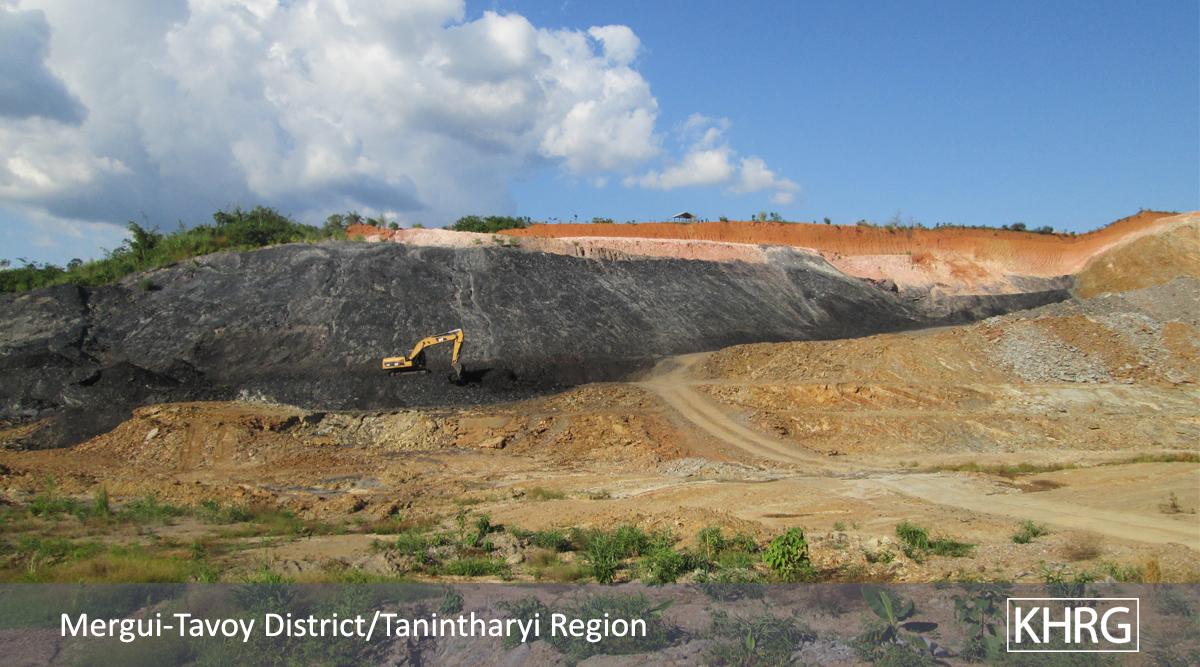In Tanintharyi Township, the Tatmadaw has been involved in extorting taxes and confiscating property from local community members. The Pyi Pyoe Htun Company has forced local community members to sell coastal lands for the development of a fishery. Local communities continue to face difficulties accessing education and an increase in drug trafficking.
Situation Update | Tanintharyi Township, Mergui-Tavoy District (November 2017 to January 2018)
The following Situation Update was received by KHRG in February 2018. It was written by a community member in Tanintharyi District who has been trained by KHRG to monitor human rights conditions.[1]
Tatmadaw Military Activity
In Beh Khoh Paw Plaw village, Tatmadaw Battalion 53 is extorting money from villagers who depend on rubber cultivation for their livelihoods. They intimidate workers into paying 20,000 kyat (US $12.61) as a monthly tax for each rubber processing machine.
Tatmadaw Battalion 53 has also confiscated wood from local villagers. They forced them to hand over planks of wood that they had logged in a neighbouring forest. Tatmadaw Battalion 53 subsequently used the wood to build their army camp.
Livelihood Challenges and Land Confiscations
The villages in K’Ta Kloh area depend on subsistence agriculture, betel nut and coconut plantations, logging and fishing. Because of difficult economic conditions, many people are migrating to Thailand to find jobs.
The Pyi Pyoe Htun Company has forced local community members to sell coastal lands. They are privatising the lands for the farming of prawns, crabs and fish.
Education
There are many barriers to education in Tanintharyi Township. Because many households depend on subsistence agriculture and small-scale fishing, they cannot afford to send their children to school.
Many villages only have primary schools. The schools in Blah Loh, K’Beh Chaw and T’Pa villages can accommodate students up to Eight Standard. There are no high schools that reach Tenth Standard in Tanaw Th’ree Township. Rural children in Southeast Myanmar face difficulties graduating from high school because of a lack of access to education.
Teaching Karen language is restricted in many villages in Tanintharyi Township. In some villages, Karen language is only taught outside of the normal school hours: from 8:00 AM to 9:00 AM in the morning, and from 3:00 PM to 4:00 PM in the afternoon. In other villages, Karen language classes are only held on Saturday. Many students find it difficult to learn Karen language because it is not taught during normal school hours.
Drugs
Drugs are present in almost all villages in K’Ta Kloh area. The main drugs being sold are opium, crystal methamphetamine, and ya ba.[2] Local community members believe that the Karen National Union and the Myanmar government should do more to handle the increase of drug trafficking.
Footnotes:
[1] KHRG trains community members in southeast Burma/Myanmar to document individual human rights abuses using a standardised reporting format; conduct interviews with other villagers; and write general updates on the situation in areas with which they are familiar. When writing situation updates, community members are encouraged to summarise recent events, raise issues that they consider to be important, and present their opinions or perspective on abuse and other local dynamics in their area.
[2] Yaba, which means ‘crazy medicine’ in Thai, is a tablet form of methamphetamine. First developed in East Asia during the Second World War to enhance soldiers' performance, methamphetamine has become increasingly popular in Thailand, Laos, Cambodia, Vietnam, and Burma/Myanmar where it is typically manufactured. See, Yaba, the 'crazy medicine' of East Asia, UNODC, May 2008; Chapter IV in Truce or Transition? Trends in human rights abuse and local response in Southeast Myanmar since the 2012 ceasefire, KHRG, June 2014; “Thaton Situation Update: Bilin Township, July to September 2016,” KHRG, April 2017; and “Dooplaya Field Report: A quasi-ceasefire? Developments after the Nationwide Ceasefire Agreement, from January to December 2016,” KHRG, September 2017.



